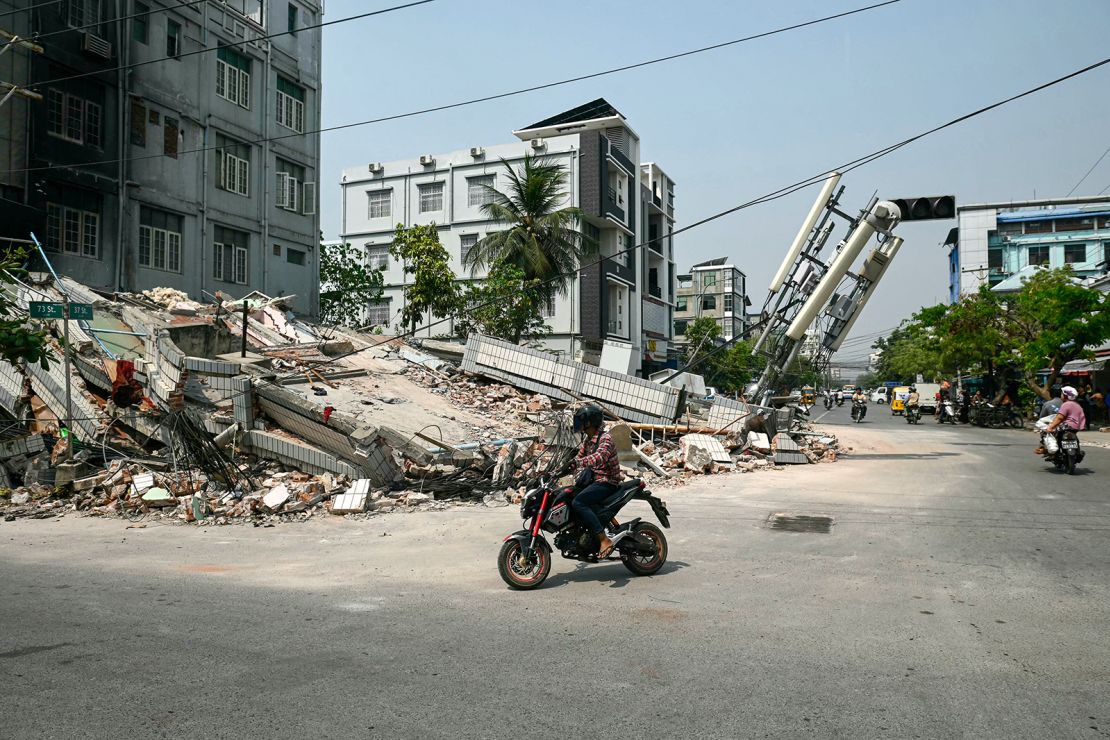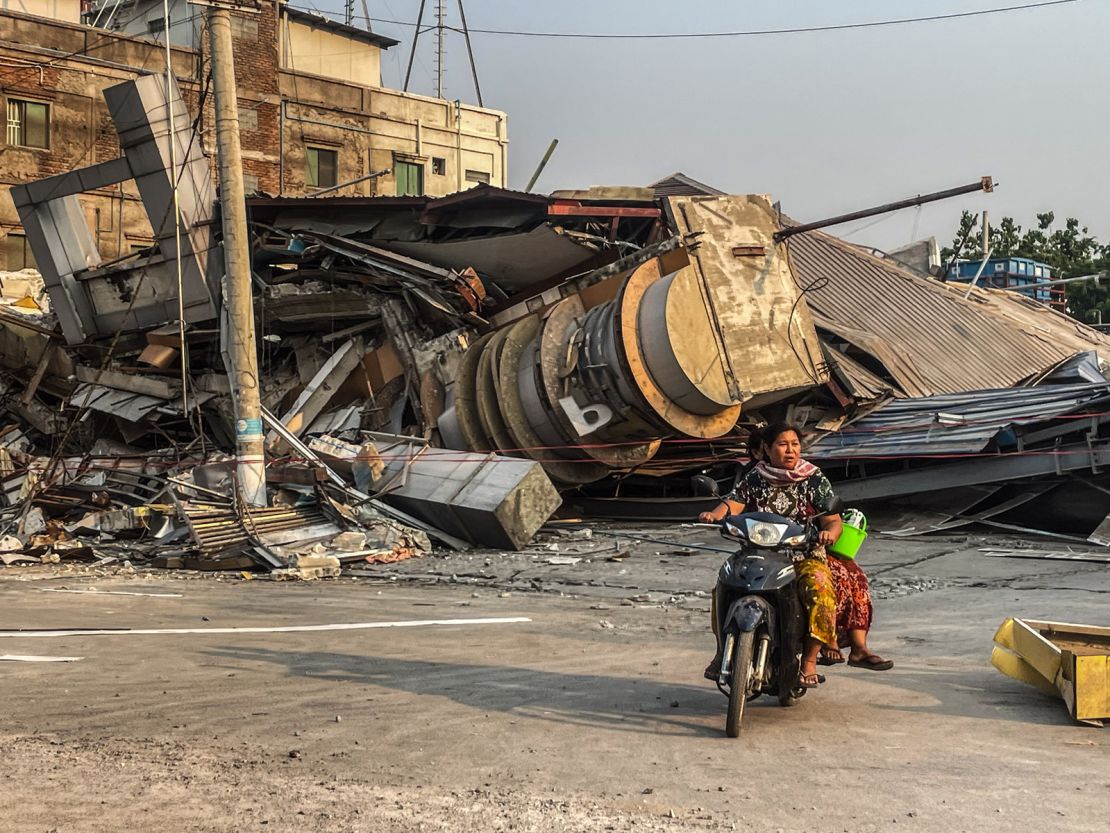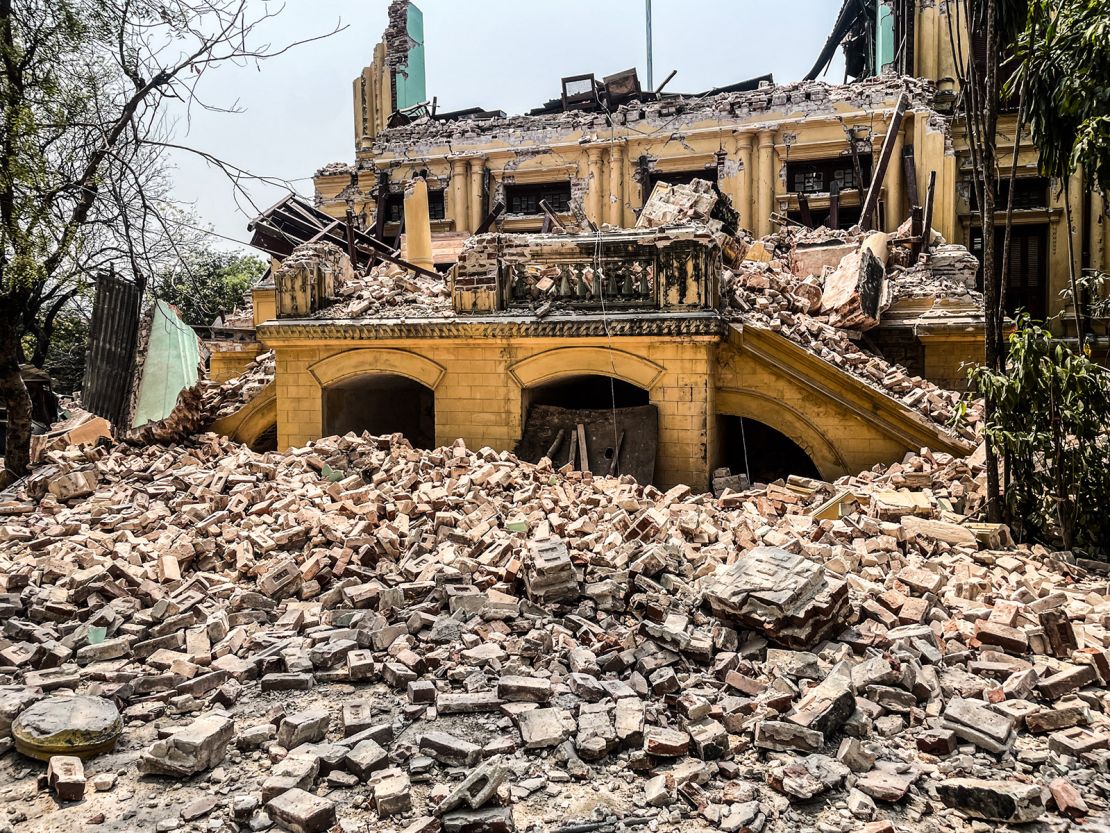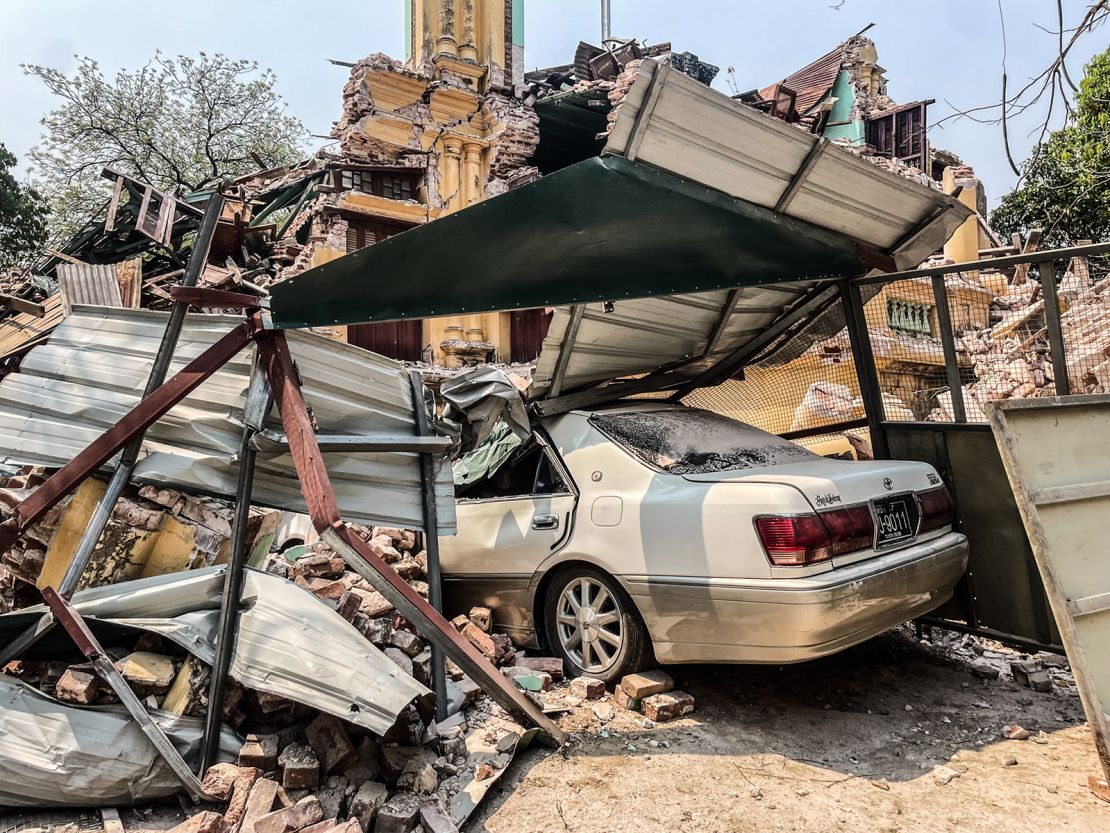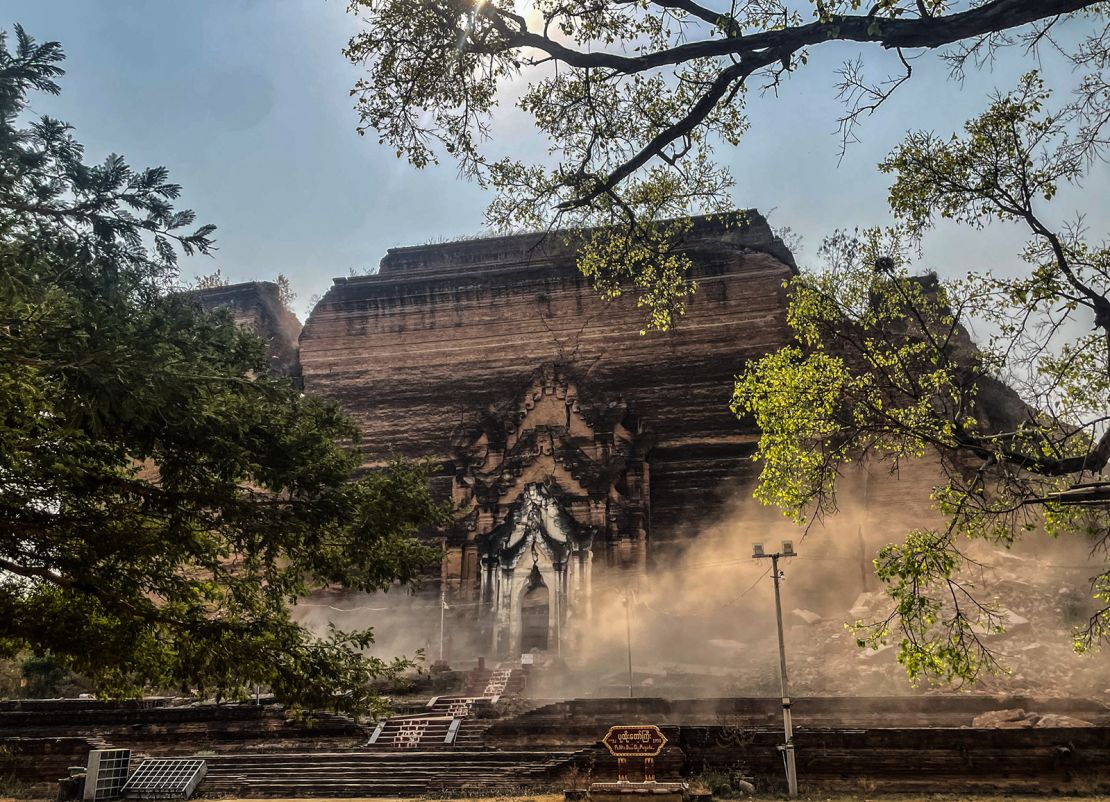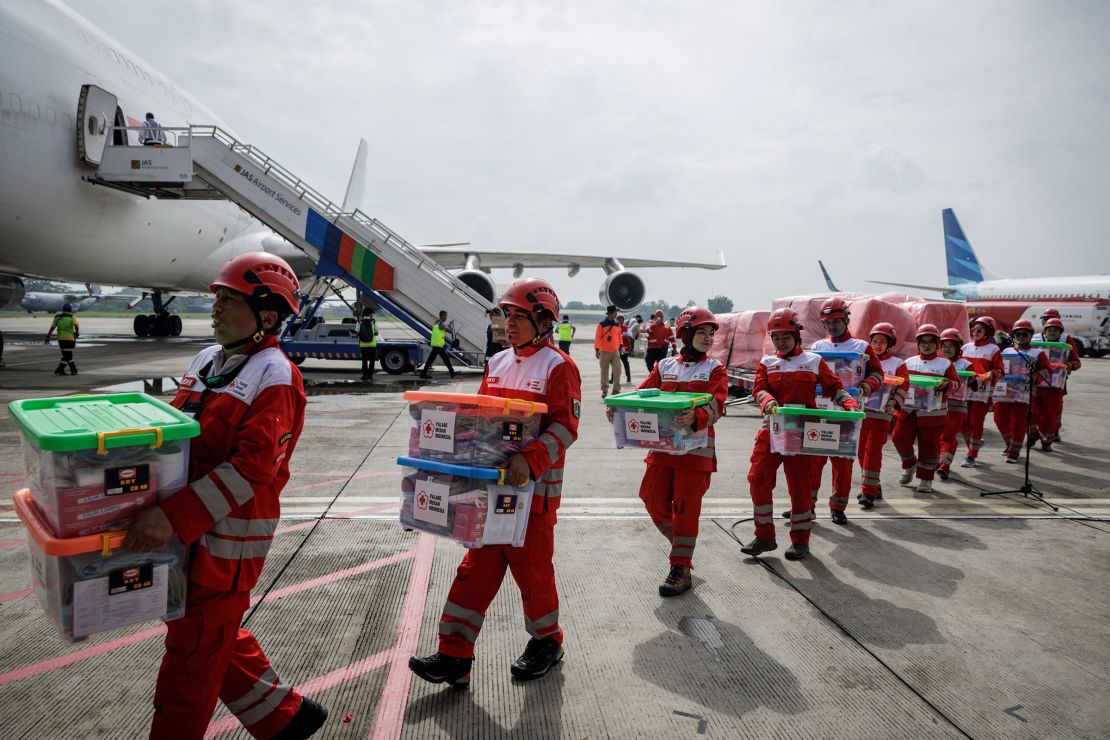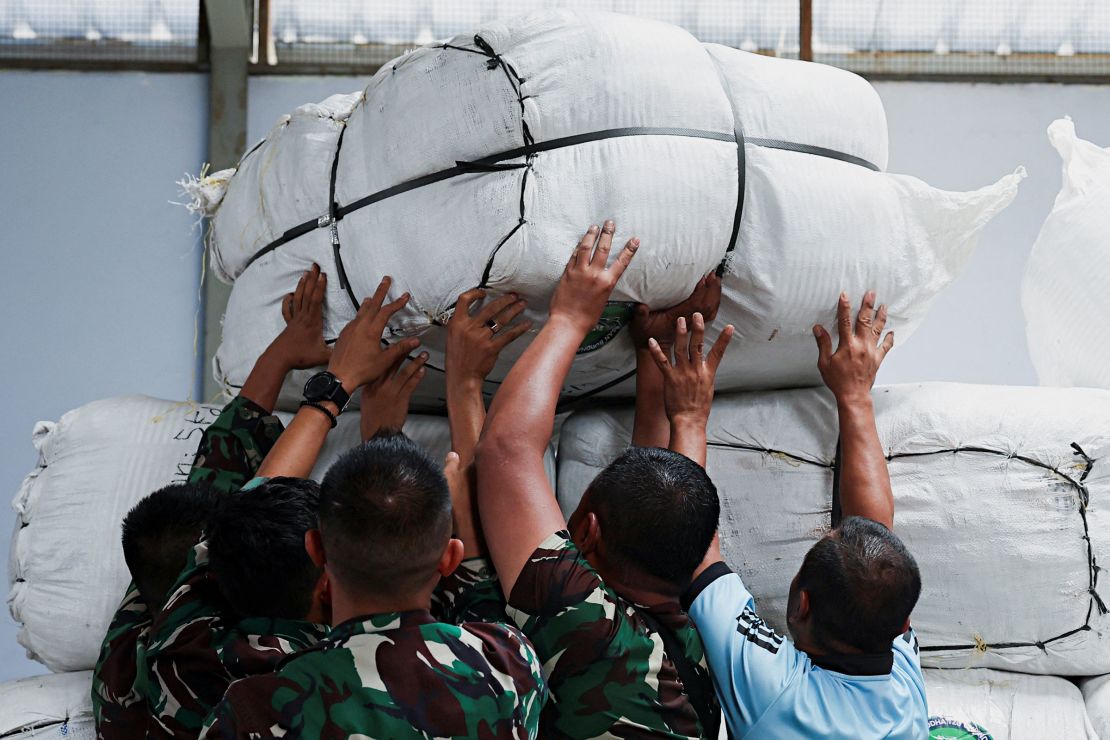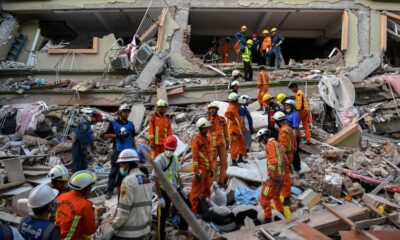CNN
—
As the road shook beneath him, Ko Zeyer sped past crumbled buildings, buckled roads and gaping sinkholes toward his hometown of Sagaing, the epicenter of the most powerful earthquake to hit Myanmar in a century.
The journey from Mandalay normally takes 45 minutes by car across the mighty Irrawaddy River, but after the quake hit last Friday, it took him 24 hours to navigate broken bridges and collapsed buildings.
Ko Zeyer found his family safe, but many of his friends had died and much of the town lies in ruins, as local rescuers scramble for resources in a country controlled by a paranoid military junta and plagued by civil war.
All around him, people remain trapped under the rubble, not yet counted among the 3,145 confirmed dead a week after the devastating quake.
“The smell of the dead bodies has overwhelmed the town,” said Ko Zeyar, a social worker, as other residents described the rush to bury bodies in mass graves.
Survivors queue for food and water, and many sleep outside on mats at the mercy of mosquitos and the baking 100° F (37° C) heat as aftershocks continue to rattle the region.
“Almost the entire town lives and sleeps on the road, a platform or football pitch, including myself because it is scary,” said Ko Zeyer. “I don’t sleep inside, but on the doorway so I can easily run,” he told CNN by phone as another aftershock hit Thursday evening.
The immense scale of the disaster has piled a fresh crisis on the impoverished Southeast Asian country, where almost 20 million people were already in need of humanitarian assistance after four years of civil war.
Junta leader Min Aung Hlaing has been fighting a multi-front war against pro-democracy fighters and ethnic armed groups after seizing power in 2021, with credible and widespread reports of atrocities against the people.
Years of war have depleted the local resources and health infrastructure needed to respond effectively to the quake, and observers say a large-scale disaster response from the country’s military government is absent.
“Why hasn’t Min Aung Hlaing sent in all of his military assets for rescue and relief?… We only see civilians digging to into the rubble,” said former United Nations Special Rapporteur for Myanmar Yanghee Lee.
In every direction he looks in Sagaing, volunteer rescue worker Kyaw Min says houses, schools, temples, mosques and shops lie in ruin.
“It looks like a place of death … like the town was bombarded by a nuclear bomb,” said Kyaw Min, who is aligned with the shadow National Unity Government (NUG) and asked to use a pseudonym for his safety in the ongoing war.
The earthquake caused widespread destruction in nearby Mandalay, home to around 1.5 million people, and the military capital Naypyidaw. It was also felt in neighboring Thailand and China.
For days, Kyaw Min and volunteer rescuers have dug through rubble with their bare hands or minimal tools to look for survivors.
“We managed to save as many people as we could with the little equipment we have,” he said. “We retrieved many dead bodies, including those of children and the elderly… bodies without heads or hands or legs – we have suffered such a horrendous experience.”
About 80% of Sagaing town, the regional capital, was damaged in the quake and there is widespread destruction across the surrounding rural townships, according to Kyaw Min.
Roads connecting towns and outlying villages were torn and twisted, slowing rescue and relief efforts, including the delivery of heavy machinery such as excavators and backhoes.
“Rescue missions or aid could not immediately arrive to Sagaing. The bridges connecting Sagaing were badly damaged,” said Ko Zeyer. “That’s why, many lost their lives. It was already too late to save the people when the aid arrived.”
Since the 2021 coup, Sagaing region – a giant arc of arid land studded with the spires of pagodas has become a vast battleground between the military and pro-democracy “People’s Defense Forces,” many aligned with the ousted democratic government.
The junta controls most of the larger towns in the region, while villages are split between support for the military, thought of as “green” territory, or “red,” backers of former civilian leader Aung San Suu Kyi.
Those defying the junta have paid a heavy price.
The military regularly sends columns of troops and allied militias on bloody rampages through districts suspected of opposing its rule, where troops raze whole villages, massacre residents and leave.
And its air force launches devastating air strikes on communities.
These did not stop after the earthquake. Volunteers and witnesses contacted by CNN reported hearing or seeing multiple air strikes in different areas of Myanmar in the days immediately following the tremor.
The military on Thursday announced a temporary ceasefire to aid recovery efforts, and said the truce would last until April 22.
The announcement followed several ethnic armed groups and the NUG – an offshoot of lawmakers deposed in the coup – in declaring temporary pauses in fighting.
The junta had initially refused to issue a ceasefire, and the reversal came only after it acknowledged its troops had fired three warning shots near a Chinese Red Cross convoy delivering earthquake aid in Shan state – underscoring the dangers for those delivering disaster aid in a conflict zone.
But reports in local media and from humanitarian teams in southeast Myanmar Thursday suggest the military had already broken the ceasefire.
Myanmar’s military rulers have a long history of blocking foreign help after natural disasters, impeding access to vulnerable communities, and appropriating funds intended for disaster victims.
This time, the junta took the unusual step of quickly asking for foreign aid. International teams, including groups from China, Russia, India, Singapore, Malaysia, and Pakistan, have been assisting with rescue efforts, and in recent days, dramatic videos showing people being pulled out alive after days under rubble have featured mainly Chinese teams alongside local responders.
But residents in Sagaing say such assistance is dwarfed by the scale of the disaster and that some communities, especially in opposition-controlled areas, have not seen international help.
Local volunteers and the NUG have mobilized rescuers, medical teams and supplies to quake-hit communities through their own networks across the country. But the need is too great.
On the idyllic shores of the once popular tourist hot spot Inle Lake, in southern Shan state, the earthquake destroyed hundreds of bamboo houses on stilts occupied by impoverished villagers, according to aid workers.
One aid team who say they were the first major organization to reach the lake on Tuesday found thousands of people in need of urgent humanitarian assistance.
“They hadn’t had any visits from government officials. The only other assistance they had received was from community-based groups, other local groups,” said Claire Gibbons, a spokesperson for Partners Relief and Development, an international agency that works with local partners and networks in Myanmar.
Relief efforts to some of these hardest-hit areas have been hindered by damaged roads and military checkpoints on the main highway between the biggest city Yangon, where much of the aid is being flown into and organized, to Mandalay.
Finding people to send into the quake zone is proving difficult too, amid fears that younger people will be arrested and forcibly recruited into the army.
“We have team members from Myanmar that we don’t want to risk their safety by heading them into the earthquake areas,” said Gibbon.
Compounding the challenges are existing junta-imposed restrictions on humanitarian aid to certain areas of the country, nighttime curfews, and a junta requirement that international aid groups seek authorization before delivering supplies.
Meanwhile, the junta has also barred international journalists from entering the country and some foreign aid teams have reportedly faced issues obtaining visas from the military regime.
Some teams who traveled to Sagaing were prevented from delivering their supplies, and in some cases their aid was confiscated, according to Kyaw Min.
Others with ties to groups opposing the junta have been asked to list names of volunteers and supplies before they can enter, a scary proposition for many as the military has designated the resistance groups terrorists.
Independent Myanmar analyst David Mathieson told CNN it was “highly likely they [the military] will try and take advantage of the situation and block, reroute, or limit as much aid going into areas they do not control.”
CNN cannot independently verify the reports and has asked the Myanmar junta for comment.
The earthquake came as international humanitarian agencies are struggling with a lack of funding as governments, most notably the United States, make drastic cuts to their foreign aid budgets.
The US would typically be among the first to respond to a natural disaster of this scale with both physical and monetary support.
But following President Donald Trump’s gutting of the US Agency for International Development (USAID), the US response has been minimal, prompting condemnation from American senators and civil society groups.
Rescuers from China – a major ally and arms supplier of the junta – arrived in Yangon hours after the quake struck. And Beijing has pledged 100 million yuan ($13.76 million) worth of relief supplies, according to Chinese state media.
A small USAID team is on the ground in Myanmar, a State Department spokesperson confirmed Thursday, and the Trump administration has authorized an initial $2 million in humanitarian assistance.
Given the military’s history of appropriating and misdirecting international aid, donors and humanitarian agencies have been urged to insist on aid impartiality and work through local civil society organizations, including the National Unity Government and resistance groups, to avoid lining the pockets of the junta.
But an overall lack of aid funding could prove disastrous for the people of Myanmar.
“My real worry is that the international community will not respond in the scale that is needed,” said Richard Horsey, Crisis Group Senior Adviser.
In Sagaing, those focused on helping quake-hit communities say the most urgent needs are for clean water and food, tarpaulins for shelters, mosquito nets to prevent dengue fever, medicine to prevent diseases from drinking contaminated water, cooking utensils, and sanitation kits.
“Seeing many in pain and grief feels really sad,” said Ko Zeyer.
“We don’t even dare to ask how many have died, because the scale of the death is such that almost every family has had a loved one killed.”
